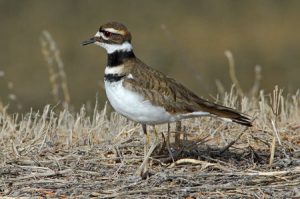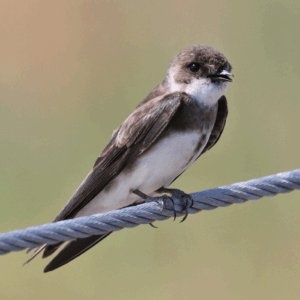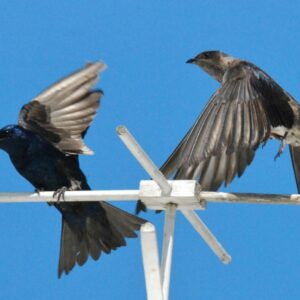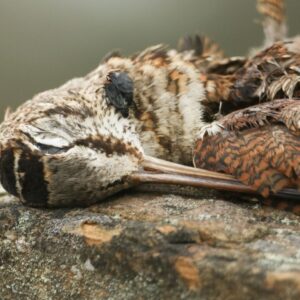The Killdeer Bird, and its Real Estate in the Capital
Recent news about the now-notorious nesting killdeer[1] at the site of Bluesfest, one of Ottawa’s largest outdoor events, has led to many asking the question: what regulations are in place in Canada to protect nesting bird species from destruction or interference?
This article was written by Brodie Badcock-Parks, a Nature Conservation Intern at Nature Canada.
The Migratory Birds Convention Act (MBCA)[2] is a law enacted by the Parliament of Canada in 1917 (updated in 1994) aimed at “protecting and conserving migratory birds – as populations and individual birds – and their nests”. It is one of the oldest conservation laws in Canada and was established in response to the bilateral Migratory Birds Convention, 1916, between the United States and the United Kingdom (on behalf of Canada). The act offers legal protection for over 350 species[3] and their nests, with its regulations explicitly stating that, “no person shall hunt a migratory bird” (s. 5) or “disturb, destroy or take a nest, egg, nest shelter […] of a migratory bird” (s. 6a). Under the MBCA, Environment and Climate Change Canada (ECCC) is mandated to protect individual and populations of these birds and their nests, and regulates potentially harmful human activities that could affect or endanger them. Permits issued by ECCC are required for activities including hunting (e.g. waterfowl), scientific research, or nest disturbance/transport, among others.

A Killdeer Bird, photo by Robert Sivinski.
A prominent element of the MBCA was the creation and designation of Migratory Bird Sanctuaries[4], protected areas established for the conservation of migratory birds in Canada. Currently there are 92 Migratory Bird Sanctuaries[5] in Canada, which span over 11.5 million hectares in nine provinces and two territories. In Migratory Bird Sanctuaries, no hunting of any kind is permitted and stricter permit regulations are in place for researchers who wish to disturb nests and habitat.
Individuals who unlawfully hunt or disturb migratory birds protected under the MCBA will face heavy fines and could potentially face time in prison. Recently, ECCC has cracked down on violations of the Act, with recent charges being laid against three Ontario hunters in May 2018[6] (combined reparations totaling $19,000), as well as two migratory bird traffickers in Newfoundland[7] in December 2017 (both charged with heavy fines & loss of hunting permits).
Corporations who violate the MCBA will often face larger fines and are added to the Environmental Offenders Registry. Notable corporate violators of the Act have included Syncrude Canada Ltd., who were fined upwards of $3 million[8] for the deaths of approximately 1600 ducks on its tailing ponds near Fort McMurray in 2010; as well as Canaport LNG, fined $750,000 after over 7500 migratory songbirds were killed[9]after being drawn to a gas flare in Saint John in 2013.
In short, the Migratory Birds Convention Act is an important piece of legislation because it protects an integral part of ecosystems all across Canada. Migratory birds are a key indicator of the overall health of our environment[10] and attempts to disturb or harm these birds should not be taken lightly. Continued enforcement of this Act to protect listed species like the killdeer, a species facing large declines in population across North America[11], will produce positive benefits not only for the birds, but for the environment as well.

Signage at Grand Manan Migratory Bird Sanctuary in New Brunswick (Photo: Environment and Climate Change Canada)
For media coverage on this topic, please consult the following
CTV National News clip from June 25, 2018 discussing the famous killdeer nesting at the Lebreton Flats, (site of Ottawa’s upcoming annual Bluesfest concert), featuring Nature Canada’s very own Naturalist-Director, Ted Cheskey!
A small bird, nest and four eggs hold up major Ottawa music festival, from CTV News on Monday, June 25.
Ottawa Bluesfest hatching plans after Killdeer nests at site of main stage, from the Ottawa Citizen on Monday, June 25.
Bluesfest awaiting OK to move ‘bluesnest’, from CBC News on Monday, June 25.

|
Want more nature news?Discover more about the nature you love. |
Sanzenbacher PM, Haig SM. 2001. Killdeer Population Trends in North America (Tendencias Poblacionales de Charadrius vociferus en Norte América). J. Field Ornithol. 72(1):160-169.




